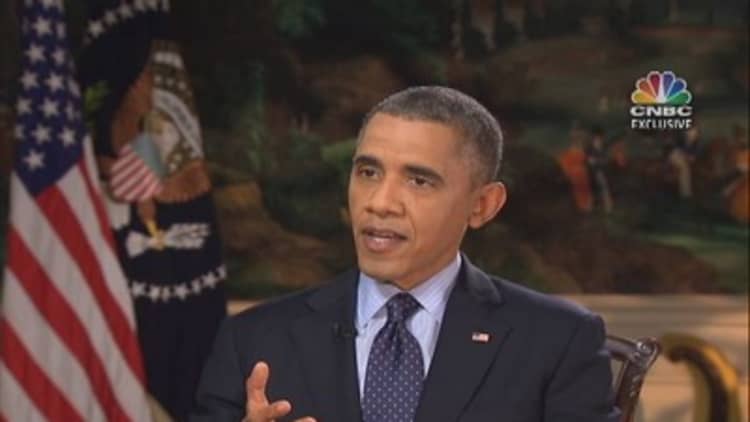As the U.S. government shutdown moves into a third day, analysts at Bank of America Merrill Lynch say three pressure points must be triggered to snap politicians out of the gridlock.
Washington was officially shut down for the first time in 17 years on Tuesday after Democrats and Republicans failed to come to an agreement on renewing the federal budget into the new year, sending around 800,000 government workers home without pay.
(Read More: The phrase that betrays: 'Government shutdown')
"We are looking for three pressure points to induce a return to common sense in Washington," said Ethan S. Harris, global economist at BoAML.
The first pressure point, according to Harris, will be discontent with Congress expressed through public opinion polls. U.S. polls over the weekend already showed that approval ratings for Congress had halved, slipping to 10 percent, Harris pointed out.

The second trigger will come when the growing level of discontent with the U.S. government translates into an assignment of blame, which Harris said looked likely to fall on the Republicans.
According to a CNN poll cited in the BoAML note, when asked who would be responsible for a longer shutdown of the U.S. government, 46 percent of respondents blamed Republicans in Congress, 36 percent pointed to Obama and 13 percent said both.
(Read More: Obama to Wall Street: This time be worried)
And finally, the third pressure point would be triggered by the stock market, said Harris, suggesting that signs of a panicked selloff could spur U.S. politicians into action.
So far, global equity markets have shown a relatively muted reaction to news of the shutdown.
Wall Street closed in the red on Wednesday, but off of earlier session lows. was down 0.39 percent and the S&P 500 closed 0.07 percent lower. Meanwhile, major Asian indices also indicated only mild investor caution over the issue, as Japan's opened roughly 0.3 percent lower on Thursday, while Australian stocks traded 0.3 percent higher.
However, in a White House interview late Wednesday, President Barack Obama said financial markets should be genuinely worried about the budget stalemate on Capitol Hill.
"I think this time is different, I think they should be concerned," Obama told CNBC's Jon Harwood. "It is important for [Wall Street] to recognize that this is going to have a profound impact on our economy and their bottom lines, their employees and their shareholders," he added.
(Read More: The government shutdown probably kills the 'Octaper')
Andy Cross chief investment officer at the Motley Fool, told CNBC Asia's Squawk Box on Thursday that it would take a sizeable stock market correction to spur Congress into action.
"I think [a potential equity market correction] has to be significant for them to really wake up, because there is so much anger back and forth. But I think we actually may see some pullback here and that's a good time to be buying stocks for long term investors," said Cross.
Deliberation over funding for President Barack Obama's Affordable Care Act, otherwise known as 'Obamacare,' has been the major source of the stalemate between the two major U.S. political parties. The Republicans want to delay the bill, while Democrats refuse to budge on the issue.
—By CNBC's Katie Holliday: Follow her on Twitter @hollidaykatie


